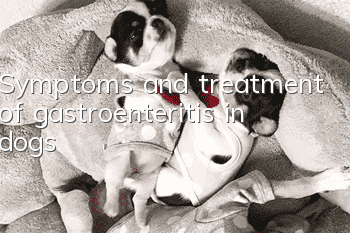Symptoms and treatment of gastroenteritis in dogs

When dogs get gastroenteritis, in addition to poor spirits, loss of appetite, and even death, the most important symptoms are diarrhea, arched back, abdominal pain, hyperactive bowel sounds, tenesmus, etc., and feces stained around the anus. When encountering this situation, I believe many people are helpless and rush to the hospital. If they are lucky, the dog can be cured. If not, a large amount of RMB will be blackmailed and the dog's life will be lost! Below, the editor of ePet will discuss with you how to identify and treat dog enteritis.
Clinical symptoms of dog gastroenteritis
Dog gastroenteritis is a relatively common clinical canine digestive tract disease. Since many dogs have gradually become unable to eat unhygienic or difficult-to-digest food during their long-term living with humans, once the dog eats Unclean or indigestible food can cause gastroenteritis in dogs. Canine gastroenteritis can be divided into three types: infectious, food-related and foreign body-related. So what are the different characteristics of the symptoms?
1. Infectious gastroenteritis
The sick dog was listless, unable to move, its body temperature rose to 40°C, and it was unwilling to move. It had a cracked nose, flushed conjunctiva, purulent eye urine, loss of appetite, vomiting and diarrhea from time to time, and discharged black watery bloody feces with a fishy smell. , the bowel sounds are thunderous during auscultation, and the sounds of "gulu" and "gulu" can also be heard outside the body. In the later stages of the disease, he lost weight, sunken eye sockets, and was highly dehydrated. Died from dehydration and exhaustion.
2. Food-induced gastroenteritis
Food-induced enteritis in dogs is often caused by improper feeding, such as feeding food that is too rough and hard to digest, spoiled meat or feed containing toxic substances, etc., which leads to disruption of digestive function and inflammation of the intestinal mucosal surface.
3. Foreign body gastroenteritis
Dog foreign body enteritis is a digestive tract disease caused by direct damage to the intestinal mucosa of dogs mainly caused by foreign bodies in food.
Prevention and treatment measures for dog gastroenteritis
Dog gastroenteritis is a common digestive tract disease in dogs. When a dog has symptoms such as depression, cracked nose, vomiting, and diarrhea from time to time, it is necessary to consider whether the dog is suffering from gastroenteritis. Since there are three categories of canine gastroenteritis, owners need to go to the hospital as soon as possible to avoid delaying the condition.
1. Infectious hemorrhagic gastroenteritis
Prevention. First of all, we must pay attention to the management of dogs, prevent them from developing thermal infectious diseases, and achieve early detection and early treatment.
treat. mainlyFor rehydration, use 1000 ml of 5% glucose, 500 ml of normal saline, and 4 ml of vitamin C. Mix and inject intravenously to prevent dehydration and enhance the body's disease resistance. At the same time, use 10% sodium sulfadiazine injection, 5 to 10 ml per intramuscular injection. , 2 times a day, for 3 to 4 days. Severely sick dogs, in addition to the above-mentioned drug treatments, also need to take 2 tablets of 0.1 g/tablet Morinavidine Hydrochloride (Virusin) orally, twice a day for 3 days.
2. Food-induced gastroenteritis
Prevention. Improve feeding and management, prohibit feeding moldy and spoiled feed, do not drink dirty water, and do not feed rough and hard food to puppies that are difficult to digest. Switch to easy-to-digest, non-irritating food.
treat. Antibacterial anti-inflammatory. If there are fishy diarrhea symptoms, use gentamicin sulfate, intramuscular injection at 2 to 3 mg per kilogram of body weight; if watery stools are produced, use streptomycin sulfate 10,000 units/kg of body weight and 1% berberine sulfate 2 to 4 ml mixed intramuscularly. If diarrhea persists or is severe, you can take 0.1 to 0.2 grams of sulfaguanidine per kilogram of body weight (double the first dose) 3 times orally or furazolidine 0.1 to 0.2 grams once, twice a day. Replenish fluids and cleanse the intestines according to the condition. If the feces is mixed with mucus and undigested food, you can take Guden probiotics orally; if you have vomiting, use 2 ml of Amor Injection, intramuscular injection to stop vomiting, etc., and you can also provide symptomatic treatment according to the condition.
3. Foreign body gastroenteritis
Prevention. Feeding and management should be strengthened at ordinary times, and food containing foreign matter should be prohibited.
treat. It mainly uses antibacterial, anti-inflammatory and prevents secondary infection of damaged intestinal mucosa. For example, use 5 to 10 ml of 10% sodium sulfadiazine injection intramuscularly, and at the same time, inject an appropriate amount of oil laxative lubricant, such as about 100 ml of liquid paraffin or lettuce oil to lubricate the intestines, which will help foreign matter pass from the intestines to the feces. If blood is found in the feces, 2 to 4 ml of Anluoxue injection needs to be injected intramuscularly. The above medicines are taken twice a day for 3 consecutive days.
- How do you know your dog has entered the birth canal?
- Prevention and treatment of heatstroke in dogs!
- How much dog food should you feed an Alaskan puppy?
- What items should be checked for pet respiratory system examination?
- What to do if Samora is rare?
- Are Chinese Garden Dogs afraid of the cold?
- Why are dogs allergic to dog food? What specific symptoms?
- 8 common reasons why dogs vomit
- What is the cause of alopecia in dogs?
- What kind of dog food is good for Huskies? What else should you pay attention to when choosing dog food?



